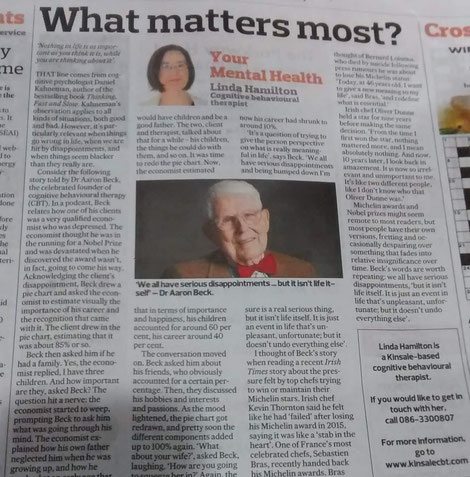
In last week's Southern Star, I discussed how when things go wrong in life, CBT can help us see that things may not be as black as they seem. The column is reproduced below.
'Nothing in life is as important as you think it is, while you are thinking about it'.
That line comes from cognitive psychologist Daniel Kahneman, author of the bestselling book Thinking, Fast and Slow. Kahneman’s observation applies to all kinds of situations, both good and bad. However, it’s particularly relevant when things go wrong in life, when we are hit by disappointments, and when things seem blacker than they really are.
Consider the following story told by Dr Aaron Beck, the celebrated founder of cognitive behavioural therapy (CBT). In a podcast, Beck relates how one of his clients was a very qualified economist who was depressed. The economist thought he was in the running for a Nobel Prize and was devastated when he discovered the award wasn’t, in fact, going to come his way. Acknowledging the client’s disappointment, Beck drew a pie chart and asked the economist to estimate visually the importance of his career and the recognition that came with it. The client drew in the pie chart, estimating that it was about 85 per cent or so (continued below...)
Beck then asked him if he had a family. Yes, the economist replied, I have three children. And how important are they, asked Beck? The question hit a nerve: the economist started to weep, prompting Beck to ask him what was going through his mind. The economist explained how his own father neglected him when he was growing up, and how he resolved at an early age that he wouldn’t do the same – he would have children and be a good father. The two, client and therapist, talked about that for a while – his children, the things he could do with them, and so on. It was time to redo the pie chart. Now, the economist estimated that in terms of importance and happiness, his children accounted for around 60 per cent, his career around 40 per cent.
The conversation moved on. Beck asked him about his friends, who obviously accounted for a certain percentage. Then, they discussed his hobbies and interests and passions. As the mood lightened, the pie chart got redrawn, and pretty soon the different components added up to 100 per cent again. 'What about your wife?', asked Beck, laughing. 'How are you going to squeeze her in?' Again, the pie chart got redrawn, but by now his career had shrunk to around 10 per cent.
PERSPECTIVE
It’s a question of trying to give the person perspective on what is really meaningful in life', says Beck. 'We all have serious disappointments and being bumped down I’m sure is a real serious thing, but it isn’t life itself. It is just an event in life that’s unpleasant, unfortunate; but it doesn’t undo everything else'.
I thought of Beck’s story when reading a recent Irish Times story about the pressure felt by top chefs trying to win or maintain their Michelin stars. Irish chef Kevin Thornton said he felt like he had 'failed' after losing his Michelin award in 2015, saying it was like a 'stab in the heart'. One of France’s most celebrated chefs, Sebastien Bras, recently handed back his Michelin awards. Bras said all chefs sometimes thought of Bernard Loiseau, who died by suicide following press rumours he was about to lose his Michelin status. 'Today, at 46 years old, I want to give a new meaning to my life', said Bras, 'and redefine what is essential.'
Irish chef Oliver Dunne held a star for nine years before making the same decision. 'From the time I first won the star, nothing mattered more, and I mean absolutely nothing. And now, 10 years later, I look back in amazement. It is now so irrelevant and unimportant to me. It’s like two different people, like I don’t know who that Oliver Dunne was.'
Michelin awards and Nobel prizes might seem remote to most readers, but most people have their own versions, fretting and occasionally despairing over something that fades into relative insignificance over time. Beck’s words are worth repeating: we all have serious disappointments, 'but it isn’t life itself. It is just an event in life that’s unpleasant, unfortunate; but it doesn’t undo everything else'.